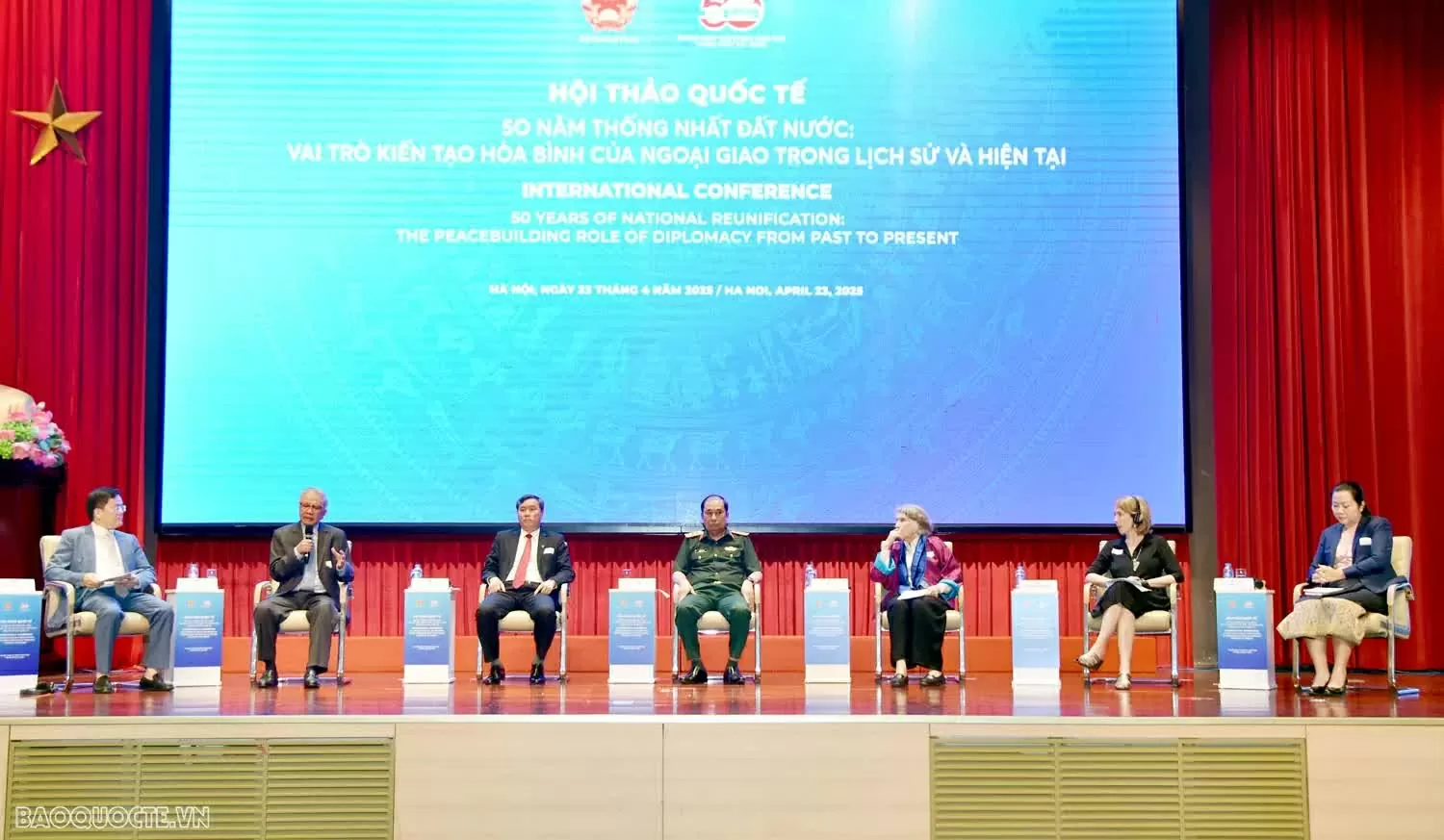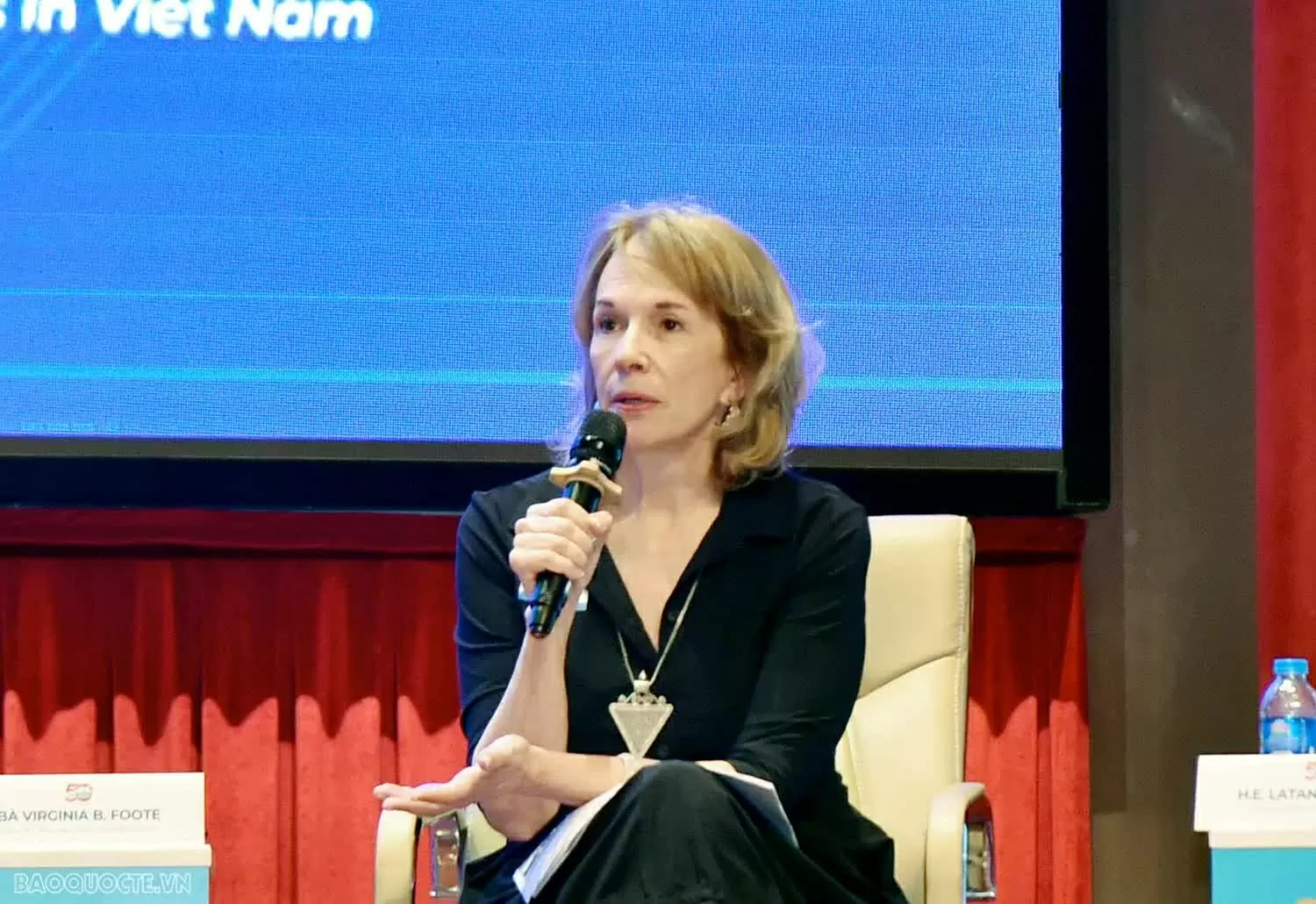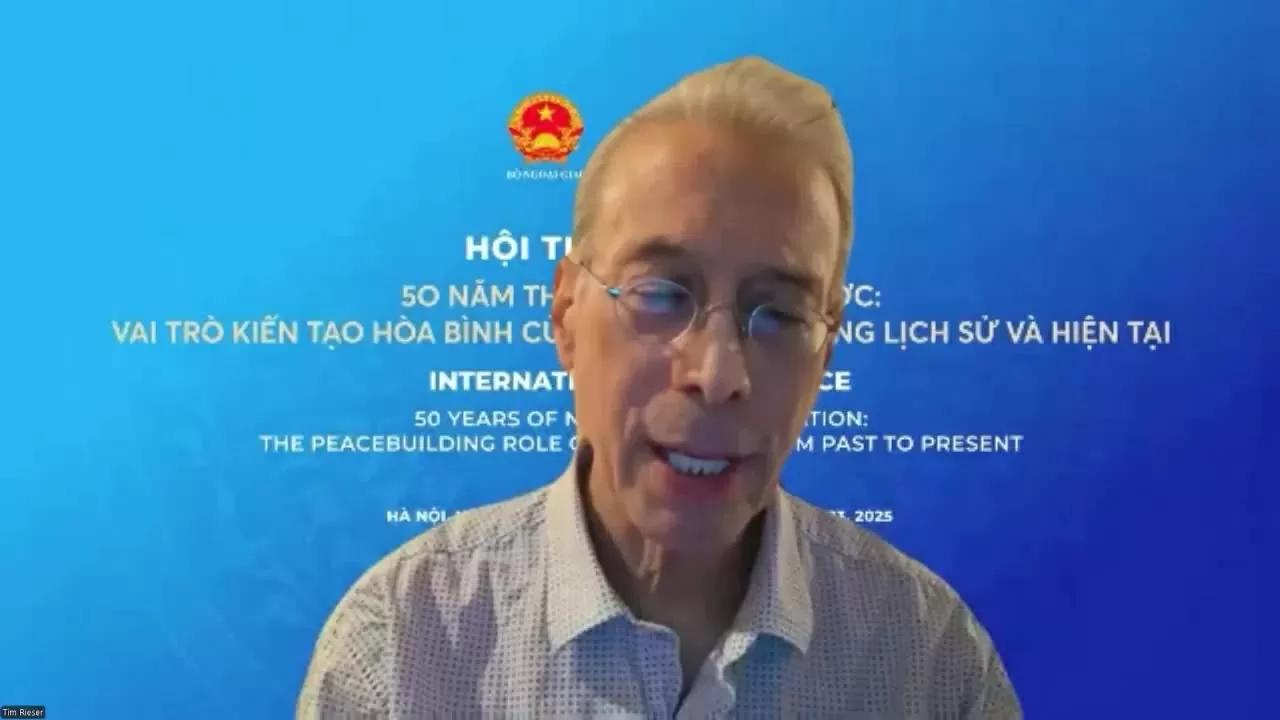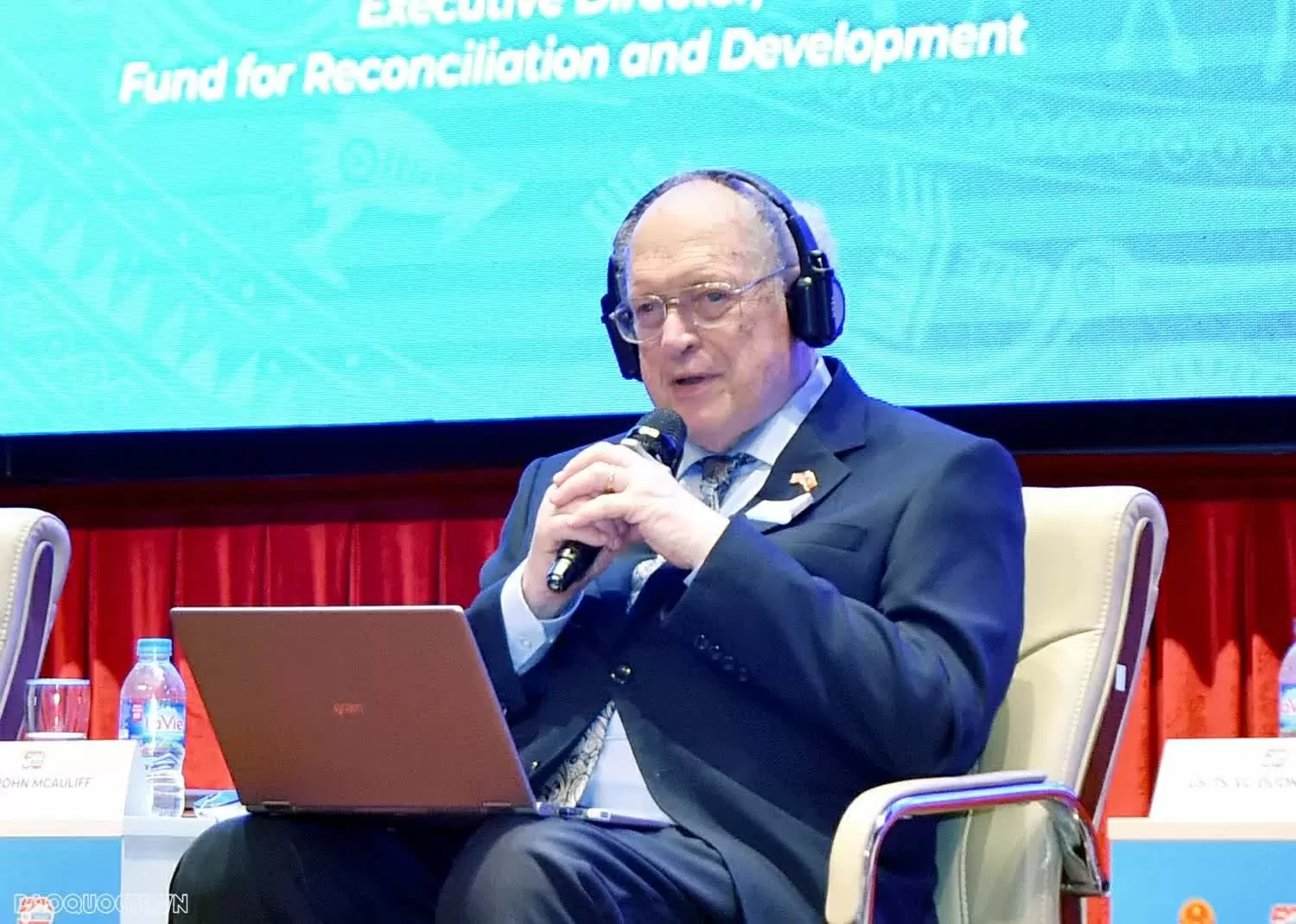
50th Anniversary of National Reunification: Tireless U.S. advocators for peace in Vietnam
Latest
 |
| Speakers at the discussion session "Vietnamese diplomacy and the historic victory of April 30, 1975" within the framework of the international seminar "50 years of National Reunification: The Peacebuilding Role of Diplomacy from Past to Present'. (Photo: Quang Hoa) |
On April 23, at the international conference titled '50 Years of National Reunification: The Peacebuilding Role of Diplomacy from Past to Present', organized by the Ministry of Foreign Affairs to mark the 50th anniversary of the Liberation of the South and National Reunification, American scholars shared many heartfelt reflections on the efforts to rebuild and strengthen bilateral relations after the war.
 |
| Ms. Virginia B. Foote, CEO of Bay Global Strategies, Vice President of the American Chamber of Commerce in Vietnam shared at the discussion session. (Photo: Quang Hoa) |
Healing the “Trans-Pacific” Wound
As a close friend of Vietnam for more than 30 years, Ms. Virginia B. Foote has witnessed all the remarkable chapters in Vietnam-U.S. relations-step by step, “overcoming the past, moving toward the future,” as the two countries transitioned from former enemies to Comprehensive Strategic Partners.
Also, because she has “spent more time living in Vietnam than in the U.S.” and “prefers Vietnamese food over American food,” her deep affection for the S-shaped country has translated into many concrete contributions to the process of normalizing and developing bilateral relations. In recognition of her tireless efforts, she was honoured with the Friendship Medal by the President of Vietnam in 2016.
Reflecting on the 30-year journey toward what she calls “the beginning of true peace,” she noted that the United States and Vietnam are now working together to build a future based on a renewed relationship and lasting peace. Looking back in time, it can be seen that the Paris Agreement not only ended the war but also laid the first bricks in constructing the ‘house’ of bilateral relations in peacetime. During the negotiation of the Paris Agreement, the two countries established ties that created the foundation for the next phase, building a new and improved partnership.
 |
| Mr. Tim Rieser, Senior Advisor to Senator Peter Welch, Senior Assistant for Foreign Policy to Senator Patrick Leahy spoke online at the Workshop. (Photo: Quang Hoa) |
Working diligently and wholeheartedly for 37 years to help normalize Vietnam-US relations alongside Senator Patrick Leahy, Mr. Tim Rieser has spared no effort in contributing to Washington's efforts to overcome the consequences of war in Vietnam. More than a quarter of a century has passed, yet Mr. Tim Rieser's contributions remain deeply valuable to projects on bomb and mine clearance, toxic pollution remediation, assistance for people with disabilities, and identification of remains of missing American and Vietnamese soldiers. His efforts have helped "clear the way" for the two countries to achieve new milestones in bilateral relations.
According to Mr. Tim Rieser, the normalization of relations in 1995 not only ended the confrontation and opened the door of hope for the future of the two countries, but also marked the starting point for the work that has lasted for the past 37 years between him and Senator Leahy, inheriting the legacy that Senators Kerry and McCain left in healing the wounds of war with Vietnam.
Although they had both lived through wartime and deeply understood the devastating consequences it brought to the peoples of both nations, Senator Patrick Leahy and Mr. Tim Rieser never imagined they would one day have the opportunity to "break the rock and pave the way" for Vietnam–U.S. cooperation. However, the normalization of relations offered a ray of hope. As Chairman of the U.S. Senate Appropriations Committee, Senator Leahy, together with his aide Mr. Rieser, was able to focus on addressing the war’s aftermath - an issue that had long posed significant challenges and acted as a “cornerstone” barrier preventing deeper bilateral ties.
In particular, the two men were accompanied by Senior Lieutenant General Nguyen Chi Vinh, who shared the same vision as Senator Leahy, wanting the two countries to "help each other" rise from the quagmire of the past, towards the "light at the end of the tunnel".
Notably, the two men were joined in this effort by Senior Lieutenant General Nguyen Chi Vinh, who shared Senator Leahy’s vision. Together, they sought for the two nations to “help each other” rise from the quagmire of the past and move toward the "light at the end of the tunnel."
General Vinh and Senator Leahy worked closely together and became close friends. “Over the years, that relationship became a driving force for us,” Mr. Tim Rieser shared, “along with support from USAID, the U.S. Department of State, the U.S. Department of Defense, and relevant Vietnamese agencies, to begin the process of addressing the legacy of the war.”
Since then, the United States has been involved in dioxin remediation at Da Nang Airport and is currently undertaking similar efforts at Bien Hoa Airport. Washington is also implementing programs to support people with severe physical and cognitive disabilities in 10 provinces across Vietnam, individuals affected by unexploded ordnance or exposure to Agent Orange.
“First of all, we need to change our perspective and the way we treat each other, because there are still some suspicions and resentments left over from the war. Therefore, we need to change our way of thinking and seek ways to transform that resentment into opportunities for cooperation,” Mr. Tim Rieser emphasized.
 |
| Mr. John McAuliff, Executive Director of the Fund for Reconciliation and Development (FRD), was among people who actively campaigned for the signing of the Paris Agreement in 1973. (Photo: Quang Hoa) |
Unlocking Vietnam's development potential
“I opposed the Vietnam War both rationally and emotionally,” said John McAuliff, CEO of the Fund for Reconciliation and Development (FRD), in an interview with the Vietnamese press marking the 50th anniversary of the signing of the Paris Agreement (January 27, 1973 – January 27, 2023).
His statement reflects his active involvement in the strong anti-war movement in the United States from 1967 to 1975. McAuliff was among those who vigorously advocated for the signing of the Paris Agreement in 1973, which contributed to Vietnam’s “resounding victory across five continents, shaking the world” against the forces on the other side of the Pacific.
Over the years, the people-to-people diplomacy efforts led by John McAuliff and the Foundation for Reconciliation and Development (FRD) have helped foster connections and enhance exchanges between individuals and non-governmental organizations in the United States and Vietnam. In recognition of these contributions, he was awarded the Medal for Peace and Friendship Among Nations by the Vietnam Union of Friendship Organizations (VUFO) in 2018, and the Friendship Medal in 2024.
Speaking on “Vietnam’s Prospects for Diplomatic Reconciliation,” Mr. McAuliff stated, “Vietnam is the country that has taught me almost everything I know about creative diplomacy over the past 50 years.” Looking ahead, he believes Vietnam can further leverage its role as a mediator and dialogue facilitator in international conflicts by enhancing coordination among relevant ministries and sectors, promoting mutual understanding, and building trust among nations. He especially highlighted the important role of VUFO in connecting Vietnam with peace-loving friends around the world and expanding its people-to-people diplomatic network.
Second, Vietnam can pursue profound internal reforms to create favorable conditions for economic development, thereby unleashing the creativity and productive capacity of its entire population, while still upholding the core values of socialism. “Let’s show the world the benefits of opening up to commercial investment,” he emphasized. “It was the Doi Moi process that contributed to the U.S. decision to lift the embargo on Vietnam.”
Third, Vietnam can further strengthen its leading and reconciling role by fulfilling its international responsibilities-beyond its participation in the United Nations peacekeeping missions, through proactive support for humanitarian solutions in conflict zones.
Half a century ago, with strong global public support - including from within the United States - the Vietnamese people overcame a force that was considered “invincible” after 1945. Today, he hopes Vietnam will continue to play a proactive and constructive role in maintaining global stability and prosperity, while inspiring other nations with its development aspirations.
It can be said that the “tireless birds” from the United States have continued to cross the ocean, connecting hearts that long for peace, joining hands to heal the wounds of war, and nurturing the friendship between Vietnam and the United States. From veterans and politicians to social activists, each contribution - though often quiet - has served as a steady brick in building the foundation of this bilateral relationship. They stand as living proof of the power of dialogue, compassion, and the shared aspiration for a peaceful and sustainably developed world.












